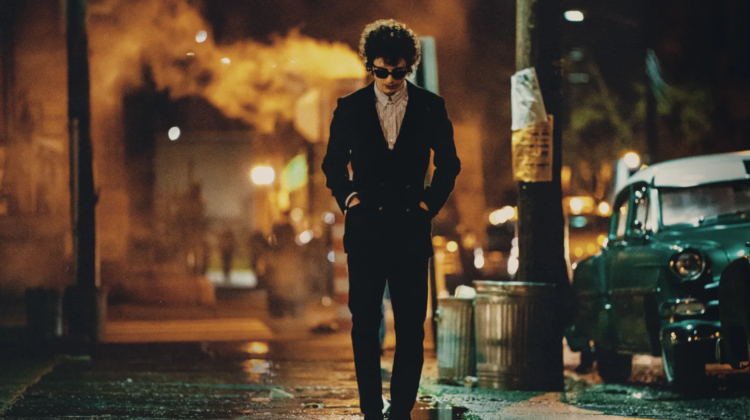Incomplete Unknowns of the Sixties Left
What the new Bob Dylan film leaves out.

|
Getting your Trinity Audio player ready...
|
[Want even more content from FPM? Sign up for FPM+ to unlock exclusive series, virtual town-halls with our authors, and more—now for just $3.99/month. Click here to sign up.]
“A complete unknown” is a line from Bob Dylan’s “Like a Rolling Stone,” performed with members of the Paul Butterfield Blues Band, including guitarist Mike Bloomfield. Long before the landmark performance at the 1965 Newport Folk Festival, Bob Dylan was quite well known. Viewers of A Complete Unknown won’t learn much about his back story.
Dylan’s actual name is Robert Zimmerman. He’s from Hibbing, Minnesota, and once played in a carnival. This information emerges during a quick flip through a photo album. The story opens in 1961, when the penniless Dylan arrives in New York. The city was home to a thriving folk-music scene, which the film conveys mainly by name dropping: Odetta, Ian and Sylvia, and so forth. Signs of the times come through snippets on the radio and black-and-white television screens that look dated even for the period.
Dylan, wonderfully played by Timothée Chalamet, is a fan of Woody Guthrie (Scott McNairy) languishing in hospital, unable to speak. Guthrie is in the company of Pete Seeger (Ed Norton) the real “unknown” in this film. The banjoist is portrayed as an innocent victim of gavel-thumping government inquisitors and a devotee of peace and social justice. Viewers get no clue that Seeger was a Communist Party “artist in uniform,” whose service went back to the Stalin-Hitler Pact.
At that time the CPUSA, a wholly owned subsidiary of the USSR, was trying to keep the USA from aiding Britain in the war against Nazi Germany, then allied with Stalin’s USSR. CPUSA activists picketed the White House and backed wildcat strikes at defense plants such as North American Aviation in Inglewood, California.
Party writer Dalton Trumbo, who joined the party during the Pact, wrote the novel The Remarkable Andrew, which warns the USA not to strike up an alliance with a country that’s “already licked.” Party singers posed as anti-war activists, but for Seeger “peace” was whatever the USSR wanted at any given time.
Norton has mastered Seeger’s sanctimonious voice and banjo playing, which made the late P.J. O’Rourke want to reach for his wire-cutters. In one scene, Seeger leads a worshipful audience in choruses of “wa-wee-ma-weh.” That is from the1930s song “Mbube,” meaning lion, by South African Zulu Solomon Linda. Seeger performed it with the Weavers as “Wimoweh,” paying the original composer a paltry $1,000. The Tokens called their version “The Lion Sleeps Tonight,” a massive hit in 1961. None of this emerges in the film and in a musical sense Dylan owes nothing to the strumming Stalinist.
Bob Dylan, an American original, is here replicated in stunning fashion. From “Blowing in the Wind,” to “The Times They Are A-Changin’,” “Don’t Think Twice, It’s Alright,” and others, veterans of the time might think it’s Bob his own self. A Complete Unknown does reveal that he’s a contentious type, mostly when challenging the record company bosses and folk purists who seek to dictate what, how, and where he plays.
Dylan thinks the voice of Joan Baez (Monica Barbaro) is too pretty. So is the rest of her, but that won’t be a problem for most audiences. The duets, beautifully staged, include “All I Really Want to Do,” is baby be friends with you. That best summarizes their up-and-down relationship.
Instead of playing “Blowing in the Wind” by himself, for the rest of his life, the Minnesota native wants to play with a band in a more rocking style. The record bosses don’t like it and the conflict comes to a head at the Newport Folk Festival. The fans revolt but Dylan comes back for an encore with “It’s all Over Now Baby Blue,” all by himself. A Complete Unknown ends it there, leaving out sequels the people should know.
In 1965, Vietnam War was growing unpopular across the board. Dylan, Baez and others represented true anti-war sentiment, without partisan bias. Old Left types like Seeger, by contrast, sought to deploy the folk idiom against the United States alone. Seeger appeared on the “Smothers Brothers” show crooning agit-prop tunes such as “Waste Deep in the Big Muddy,” critical of the United States but giving a pass to the Soviet-backed National Liberation Front (NLF). The New Left wanted a Communist victory, signified by chants such as, “ho-ho-ho, Ho Chi Minh, the NLF is gonna win.”
When the Communists did win in 1975, the New Left popped the bubbly. The Communist victory was followed by massive repression and the exodus of the “boat people.” When Joan Baez spoke out against the regime she was savagely attacked by Jane Fonda and husband Tom Hayden, mainstay of the New Left. For more on the New Left see Radical Son, by David Horowitz and this video with Peter Collier.
After Dylan went electric in 1965, the folk purists thought he was finished. Dylan would prove them wrong with albums such as “Nashville Skyline” (1969), a country classic. “Slow Train Coming,” (1979) with “Gotta Serve Somebody” revealed the spiritual vision that was there all along. The poet, first musician to win a Nobel Prize for literature, was also a prophet.
Bob Dylan is now 83, and once again the times are a-changin’. So to pay tribute in his own words:
May God bless and keep you always
May your wishes all come true
May you always do for others
And let others do for you
May you build a ladder to the stars
And climb on every rung
May you stay forever young

